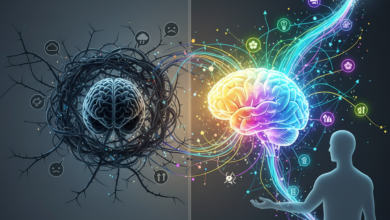How Sleep Affects Your Memory: The Science Behind It

Understanding Memory: Types and Functions
Memory is a complex cognitive process that plays a critical role in our ability to learn, retain, and recall information. It can be categorized into several types, primarily short-term memory, long-term memory, and procedural memory. Each type of memory serves distinct functions within the brain, allowing individuals to navigate daily life more effectively.
Short-term memory, often referred to as working memory, is responsible for holding a limited amount of information temporarily. It allows individuals to perform tasks such as following directions or recalling a phone number. This form of memory is highly susceptible to distraction and typically lasts only a few seconds to minutes unless actively maintained through rehearsal.
In contrast, long-term memory enables the retention of information over extended periods, ranging from days to a lifetime. This type of memory is essential for a range of processes, including learning new skills and recalling personal experiences. Long-term memory can be further divided into explicit and implicit memory. Explicit memory involves conscious recall of facts and events, while implicit memory encompasses skills and conditioned responses that occur without direct awareness.
Procedural memory, a subset of long-term memory, specifically refers to the knowledge of how to perform tasks, such as riding a bike or playing a musical instrument. This type of memory is developed through practice and repetition, making it less vulnerable to forgetting compared to other memory forms.
At the neural level, synaptic plasticity serves as the foundation for memory formation. This process involves the strengthening or weakening of synapses, which are the connections between neurons. As experiences and information are encoded, synaptic plasticity enables the brain to adapt and store memories, highlighting the importance of both cognitive function and biological processes in understanding memory.
The Science of Sleep: Stages and Cycles
Understanding the science of sleep involves recognizing its intricate stages and cycles that play a pivotal role in cognitive functioning and memory consolidation. Sleep is traditionally divided into two categories: Non-Rapid Eye Movement (NREM) and Rapid Eye Movement (REM) sleep, collectively comprising five distinct stages that the body cycles through multiple times each night.
The first stage of sleep, NREM Stage 1, is a light sleep phase where one transitions from wakefulness to sleep. It typically lasts a few minutes and is characterized by slow eye movements and reduced muscle activity. The next stage, NREM Stage 2, marks a period of deeper relaxation where the heart rate slows, and body temperature drops. This stage constitutes about 50% of total sleep time and plays a vital role in preparing the body for deeper sleep.
NREM Stage 3, often referred to as deep or slow-wave sleep, is crucial for physical recovery and growth, as it is during this stage that the body repairs tissues and strengthens the immune system. Importantly, deep sleep is also linked to important memory processes, particularly the consolidation of declarative memories—those involving facts and information that can be consciously recalled.
The final stage, REM sleep, typically occurs after approximately 90 minutes of sleep and recurs several times throughout the night. This stage is characterized by rapid eye movements, increased brain activity, and vivid dreaming. During REM sleep, the brain processes and integrates information learned during the day, reinforcing neural connections that are essential for both learning and memory retention.
In summary, the intricate interplay of NREM and REM sleep stages underlines the necessity of adequate sleep for optimal cognitive health, particularly in enhancing memory consolidation processes. Researchers continue to explore the connections between sleep stages and their profound implications on our memory and learning capabilities.
How Sleep Enhances Memory Consolidation
Memory consolidation is a critical process that occurs significantly during sleep, allowing the brain to organize, strengthen, and integrate new information acquired throughout the day. This complex mechanism involves various stages of sleep that serve different functions in enhancing memory retention and recall. Primarily, sleep is categorized into two main types: non-rapid eye movement (NREM) sleep and rapid eye movement (REM) sleep, each playing a distinct role in memory consolidation.
NREM sleep, particularly slow-wave sleep (SWS), is essential for the consolidation of declarative memories, which include facts and events. During this stage, the brain engages in activities that facilitate the transfer of information from short-term to long-term memory storage. Research suggests that during SWS, there is an increased reactivation of neural patterns associated with the learned material, effectively strengthening these memories. In contrast, REM sleep is associated with the consolidation of procedural memories, encompassing skills and tasks. It fosters creativity and problem-solving abilities, allowing individuals to integrate and apply the learned information more effectively.
Numerous studies have demonstrated that adequate sleep enhances memory retention. For example, a study published in the journal “Science” found that participants who had a full night’s sleep after learning new information performed significantly better on memory recall tests compared to those who were deprived of sleep. On the other hand, sleep deprivation poses considerable risks to cognitive performance, leading to difficulties in focusing, impaired judgment, and reduced recall accuracy. This has been illustrated by research showing that individuals who underwent sleep deprivation exhibited a marked decline in their ability to consolidate memories, resulting in poor performance on tasks requiring memory recall.
In essence, the relationship between sleep and memory consolidation is profound, highlighting the necessity for adequate sleep in optimizing cognitive functions. Understanding this connection can encourage individuals to prioritize their sleep hygiene, ultimately supporting better memory retention and cognitive performance.
Practical Tips for Improving Sleep and Memory
Enhancing sleep quality is critical for memory consolidation and overall cognitive health. To optimize sleep and subsequently improve memory, several practical strategies can be implemented in daily life. One of the most effective approaches is to maintain a consistent sleep schedule. Going to bed and waking up at the same time every day reinforces the body’s natural circadian rhythm, which can significantly enhance the quality of sleep. This regularity encourages better sleep patterns and leads to improved memory performance.
Creating an optimal sleep environment also plays a fundamental role in achieving restful sleep. A dark, quiet, and cool bedroom can promote better sleep quality. Consider using blackout curtains, earplugs, or white noise machines to minimize disturbances. Additionally, ensuring your mattress and pillows are comfortable can greatly enhance your sleeping experience. The overall ambiance of your sleeping space should invite relaxation, which is crucial for sleeping deeply and improving memory retention.
Incorporating relaxation techniques before bedtime can further boost sleep quality. Engaging in activities such as reading, meditation, or gentle stretching can help transition the mind and body into a restful state. Limiting screen time at least one hour before sleep is also advisable, as the blue light emitted by devices can interfere with melatonin production, disrupting the sleep cycle.
Moreover, good sleep hygiene practices are vital for sustaining quality sleep. This includes avoiding caffeine and heavy meals close to bedtime, as certain substances can hinder the ability to fall asleep or stay asleep. By adopting these strategies—consistent sleep schedules, optimizing the sleep environment, and employing relaxation techniques—individuals can support their memory performance and enhance cognitive health over time.






















